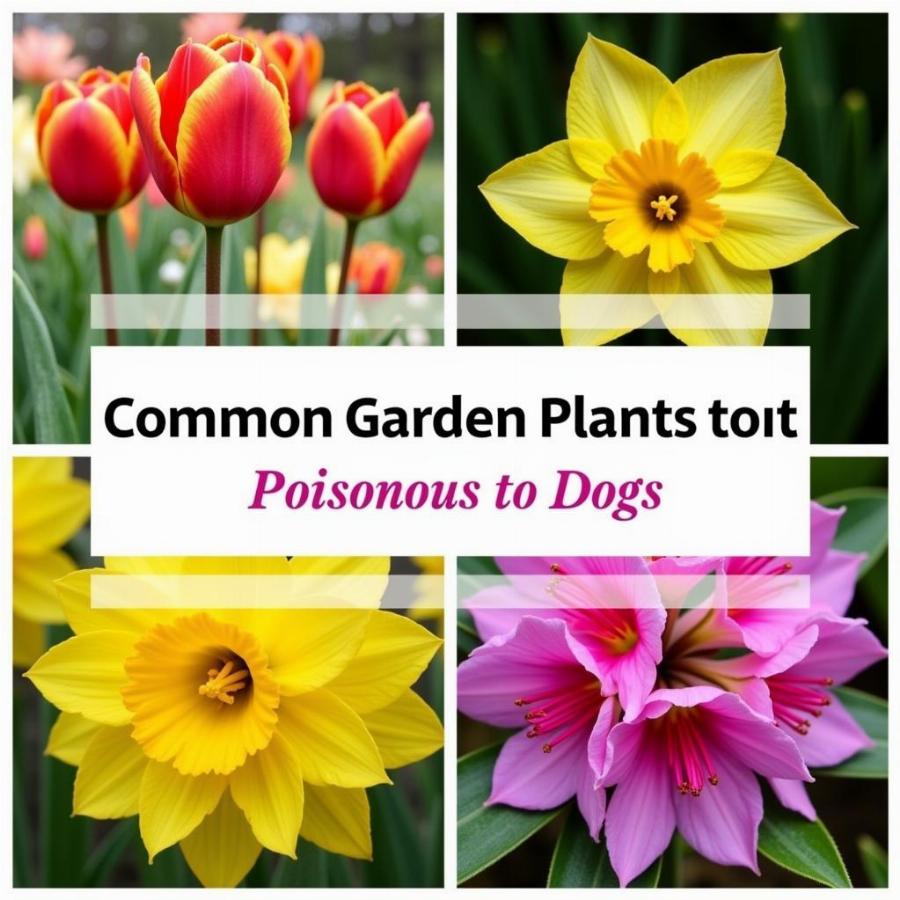Foxglove is a beautiful, bell-shaped flower that adds a touch of elegance to any garden. However, its beauty hides a dangerous secret: foxglove is poisonous to dogs. If you’re a dog owner and a gardener, understanding the risks associated with foxglove is crucial to keeping your furry friend safe. This article will delve into the toxicity of foxglove, the symptoms of poisoning, and how to prevent your dog from coming into contact with this dangerous plant.
Understanding Foxglove Toxicity in Dogs
Foxglove (Digitalis purpurea) contains naturally occurring toxins called cardiac glycosides, specifically digoxin and digitoxin. These substances interfere with the heart’s electrical activity, leading to potentially life-threatening complications. Even a small amount of ingested foxglove can cause serious problems in dogs. All parts of the plant are toxic, including the leaves, flowers, seeds, and even the water in the vase if you bring cut foxgloves indoors.
What are the Symptoms of Foxglove Poisoning in Dogs?
If your dog ingests foxglove, you might notice a range of symptoms, from mild to severe. Early signs can include vomiting, diarrhea, loss of appetite, and drooling. More serious symptoms involve changes in heart rate and rhythm, weakness, collapse, tremors, and seizures. In extreme cases, foxglove poisoning can be fatal.
What should you do if you suspect your dog has ingested foxglove?
If you see your dog eat any part of the foxglove plant, or if they exhibit any of the symptoms mentioned above, immediate veterinary attention is crucial. Time is of the essence when dealing with foxglove poisoning.
Preventing Foxglove Poisoning: Keeping Your Dog Safe
The best way to protect your dog from foxglove poisoning is to prevent access to the plant. If you choose to grow foxglove in your garden, make sure it is in an area your dog cannot reach. Consider fencing off the area or planting the foxglove in raised beds or containers. Regularly inspect your garden for any stray foxglove seedlings that might have sprouted in accessible areas.
Are there alternative plants that are safe for dogs?
Yes, there are many beautiful and dog-friendly alternatives to foxglove. Consider planting snapdragons, zinnias, or sunflowers, which provide vibrant color without posing a threat to your pet.
First Aid and Veterinary Treatment for Foxglove Poisoning
While waiting for veterinary care, you can try to induce vomiting if your dog has recently ingested foxglove and is not already showing severe symptoms like seizures. However, always consult with a veterinarian or animal poison control center before inducing vomiting. Veterinary treatment for foxglove poisoning often includes inducing vomiting, administering activated charcoal to absorb the toxins, and providing supportive care such as intravenous fluids and medications to stabilize the heart rhythm.
How to Identify Foxglove
Recognizing foxglove is vital for prevention. Foxglove typically grows in clumps and has tall stems with clusters of tubular, bell-shaped flowers. The flowers are usually purple, pink, or white and have distinctive speckled markings inside. The leaves are fuzzy and have a slightly wrinkled texture.
Other Potential Garden Hazards for Dogs
Foxglove is not the only plant that can be toxic to dogs. Other common garden plants that pose a threat include tulips, daffodils, azaleas, and rhododendrons. It’s important to research the plants in your garden and ensure they are safe for your canine companion.
 Common Garden Plants Toxic to Dogs
Common Garden Plants Toxic to Dogs
Conclusion
Foxglove, while beautiful, presents a serious danger to dogs. By understanding the risks, recognizing the symptoms of poisoning, and taking preventative measures, you can help keep your dog safe and enjoy the beauty of your garden without worry. Remember, immediate veterinary care is crucial if you suspect your dog has ingested foxglove.
FAQ
- Can dogs survive foxglove poisoning? Yes, dogs can survive foxglove poisoning with prompt and appropriate veterinary treatment.
- How much foxglove is toxic to a dog? Even a small amount of foxglove can be toxic to a dog.
- What are the long-term effects of foxglove poisoning in dogs? In some cases, dogs may experience long-term heart problems after foxglove poisoning.
- Are there any home remedies for foxglove poisoning in dogs? No, there are no effective home remedies. Seek immediate veterinary care.
- How can I make my garden safe for my dog? Research the plants in your garden and remove any that are toxic to dogs.
Beaut Dogs is your one-stop resource for all things dog-related, providing reliable and comprehensive information about the canine world. From breed characteristics to health and training advice, we have you covered. When you need assistance, contact us via Email at [email protected] for detailed and accurate answers. Visit Beaut Dogs (https://beautdogs.com) today to explore the wonderful world of dogs and learn how to care for them best!